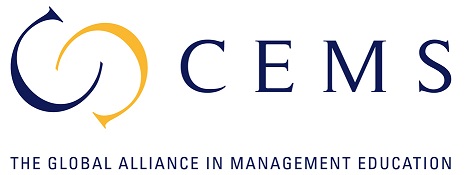
HEC-CEMS Joint Degree HEC-CEMS Joint Degree
The CEMS Master in International Management diploma can be earned alongside the HEC Master in Management - Grande Ecole degree. This diploma will represent a great asset if you are aiming for an international career in Management.
What is CEMS?
Co-founded in 1988 by HEC Paris, ESADE and the universities of Cologne and Bocconi, CEMS is a global alliance between various institutions:
- 33 world-class schools: Cornell SC Johnson College of Business, HKUST Business School, The London School of Economics, EAE São Paulo-FGV…
- 70 world-renowned multinational corporate partners: Bain & Co, Google, Daimler, Deloitte, Facebook…
- 7 NGOs: Fairtrade, Kiron, Transparency International…
CEMS promotes a uniquely high standard of education in management and allows students to gain practical skills in business and languages, as well as international experiences.
At HEC Paris, the CEMS program takes place in the M2 year. After their M1 year, spent at HEC, students spend one semester at HEC Paris (either 1st or 2nd) and the other in a fellow CEMS member school (either 1st or 2nd).
MIM-CEMS Joint Degree is mainly available to students specializing in International Business. There are also certain places available to students specializing in Accounting & Financial Management and Managerial and Financial Economics.
The curriculum:
In addition to obtaining a degree from HEC Paris, you will need to complete a business project, attend skill seminars, undertake an international internship and sit two foreign language exams in order to obtain a CEMS diploma.
- Block seminars
Block seminars bring together high-profile speakers from a wide range of sectors to introduce students to various industries across the world, often with a specific regional focus (e.g. China, India). Students are placed in teams and given assignments to test their knowledge at the end of each seminar.
- CEMS courses
Students must take CEMS Courses accounting for 45 credits in the MIM Program. These are spread over the course of both semesters, with 30 credits worth of work undertaken in the first semester and the remaining 15 undertaken in the second.
There are four kinds of courses:
- Mandatory courses: The Global Strategy Course and The Global Leadership course
- Elective courses (from among the school’s own course portfolio)
- Exclusive courses (specially designed for CEMS students)
CEMS Electives accounting for a maximum of 7.5 ECTS can be replaced by a Research Project.
- Global Citizenship Seminar
This two-day seminar brings together representatives from partner companies and NGOs alongside professors and students to simulate a senior managerial environment and impart leadership experience.
- The Business Project
Over the course of 8 weeks, teams of international students are asked to solve a real-life business problem for a company. This allows them to put their knowledge of business and management to practical use in a consulting project. These business projects account for 15 ECTS, i.e. 50% of credits required to pass the second semester. Project results are assessed by professors from the CEMS receiving institution as well as corporate advisors from the company who set the task. Teams may be requested to write a report or give a presentation.
- Skill Seminars
Skill Seminars teach you the fundamental practical skills needed to kick-start a professional career in international management. Topics include:
- Business Communication
- Strategy skills
- Personal development
- Consulting skills
- Marketing tools
- Teamwork abilities
- Negotiation techniques
- Career development
- Presentation skills
Students have to attend four Skill Seminar days in total (2 ECTS, where 1 day = 8 hours = 0.5 ECTS).
- International internship
Students can intern in companies or non-profit organizations whether they are part of the CEMS alliance or not. An entrepreneurial internship in which you launch your own business is also a possibility, so long as all the conditions of a ‘regular’ internship are met and the project is approved by the Academic Director at HEC Paris. HEC Paris will also supervise the internship.
Why join?
Alongside all the knowledge and experiences gained, the CEMS diploma comes with a range of benefits. Students gain access to the extensive CEMS network, which regroups 1,269 members from 73 nationalities.
CEMS graduates are highly coveted by renowned employers across the world and go on to lead successful careers in fields such as consultancy, financial services, pharmaceuticals and technology. 96% of CEMS graduates find jobs immediately or continue their studies. 36% are living outside their home country and 75% work for multinational companies. CEMS graduates also get to join the CAA (CEMS Alumni Association), a worldwide network of 14, 429 alumni working in over 75 countries.
Founded in 1993, the CAA is a valuable platform allowing CEMS graduates to continue enjoying the international and multicultural experience that they have experienced as CEMS students. By organizing regular panel discussions, workshops, conferences and seminars, the CAA encourages its members to broaden their professional knowledge and network.
